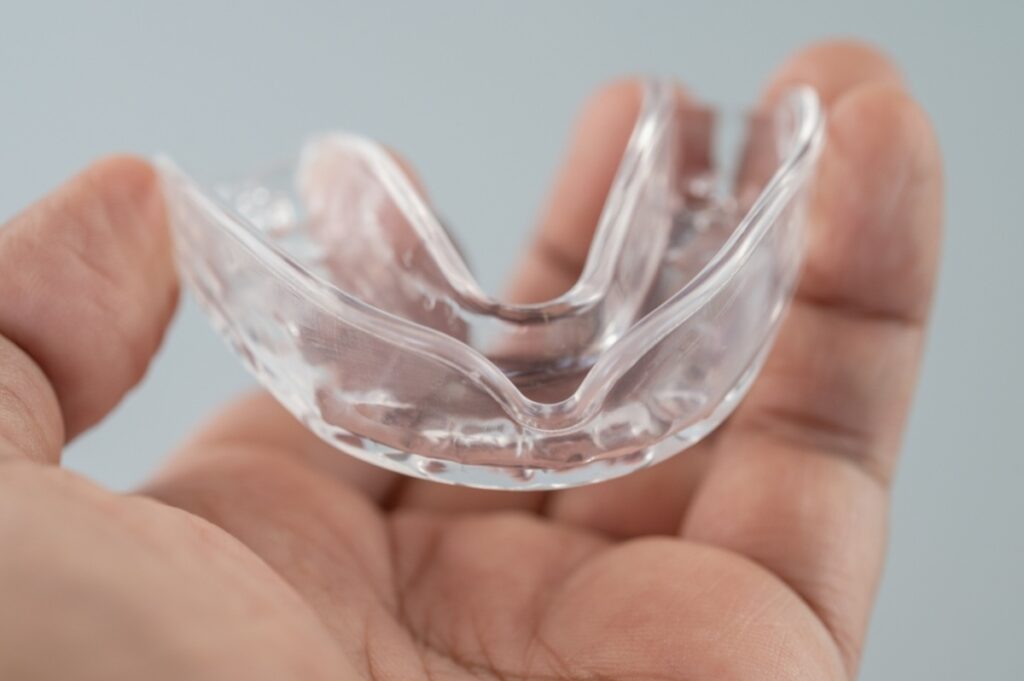Every morning, your jaw aches, and your teeth feel sore, as if they’ve been pressed all night long. The headaches, restless sleep, and worn enamel are finally starting to affect your daily life. It’s more than stress; it’s teeth grinding.
Bruxism, or teeth grinding, can silently ruin your smile while you sleep. Without treatment, you can create cracks in your teeth, gum recession, or TMJ disorders, or experience chronic facial pain.
You may not even realize it’s happening until the damage is already done; this is why a mouth guard in Vancouver is often recommended as a first course of action.
A mouth guard will cushion and protect your teeth and could be your remedy to stop grinding and to help you sleep well again.
What Is Teeth Grinding?
Teeth grinding, known as bruxism in the medical field, is the clenching or grinding of teeth in a noncontrollable manner.
It generally happens during sleep but can also happen during the day while you are awake, most commonly when you are stressed, angry, or focusing intently.
Bruxism is not just a habit. It can:
- Wear down enamel
- Cause chipped or broken teeth
- Lead to jaw pain and headaches
- Causes gum sensitivity and inflammation
- Causes sleep disturbances and fatigue
How Do Mouth Guards Help?
A mouth guard for teeth grinding is a custom-fitted dental device made from a durable plastic material.
You are meant to wear it while sleeping so that a protective barrier is created between your upper and lower teeth, and they are prevented from grinding against each other.
Does a mouth guard stop teeth grinding? Technically, it doesn’t stop the grinding but prevents what the teeth grinding can do.
When biting down on a mouth guard, you can absorb the pressure of the jaw activity while putting less strain on your jaw muscles and your teeth! This can help alleviate morning pain, prevent further wear, and help maintain a healthy bite.
What Causes Teeth Grinding?
Understanding how to prevent teeth grinding starts with identifying its causes. Common triggers include:
- Stress and anxiety – Emotional pressure is a leading cause of nighttime grinding.
- Misaligned bite – Improper alignment of the upper and lower jaws can cause friction.
- Sleep disorders – Conditions like sleep apnea often go hand-in-hand with bruxism.
- Lifestyle habits – Caffeine, alcohol, and smoking increase your risk.
- Medications – Some antidepressants and stimulants may contribute to grinding.
A proper diagnosis is essential. That’s where a dental clinic in Vancouver comes in; they can assess your symptoms and recommend the right treatment path.
Recognizing the Symptoms
You may not catch yourself grinding your teeth at night, but there are warning signs to look out for:
- Worn-down or flattened teeth
- Increased tooth sensitivity
- Sore or tight jaw in the morning
- Headaches around your temples
- Clicking or popping jaw sounds
- Earaches without infection
These signs suggest a deeper issue that shouldn’t be ignored. Visiting a dental clinic near you is a smart step to catch it before irreversible damage occurs.
Teeth Grinding Treatment Options
There are several teeth grinding treatment options available, depending on the severity and cause:
- Custom mouth guards – Offer immediate protection and reduce jaw tension.
- Orthodontics – Fix bite alignment issues contributing to grinding.
- Stress management therapy – Helps reduce emotional triggers.
- Botox injections – Temporarily relax overactive jaw muscles in severe cases.
- Medication adjustment – If grinding is a side effect of certain drugs.
The best approach usually involves a combination of dental protection and addressing the root cause.
Benefits of Using Mouth Guards for Grinding
There are clear benefits of mouth guards for grinding, especially when prescribed by a professional:
- Tooth preservation – Prevents enamel erosion and tooth fractures.
- Jaw relief – Reduces muscle fatigue and joint strain.
- Better sleep – Minimizes grinding noise and discomfort at night.
- Affordable prevention – Less costly than restorative dental work.
- Custom fit – More effective and comfortable than store-bought guards.
If you’re looking to stop grinding teeth with mouth guard use, getting a custom-fit guard from your dentist is the most reliable method.
How to Prevent Teeth Grinding Without a Mouth Guard
While guards are a front-line defence, you can also reduce grinding through lifestyle changes:
- Limit caffeine and alcohol
- Quit smoking
- Use relaxation techniques like meditation or warm baths before bed
- Practice jaw exercises to relieve muscle tension
- Ensure good sleep hygiene by sticking to a consistent bedtime
Behavioural changes paired with professional care can provide a long-term solution.
When to See a Dentist?
Don’t wait until your teeth are visibly worn or your jaw locks up. Early signs may seem small, but they can spiral into bigger dental issues quickly.
If you’re experiencing any symptoms of bruxism, schedule an exam with a trusted dental clinic near you. They can determine the best way to protect your smile moving forward.
Final Thoughts!
Teeth grinding doesn’t just ruin your sleep; it silently destroys your teeth, affects your bite, and places constant stress on your jaw.
Ignoring the signs can lead to cracked teeth, painful joints, and expensive treatments later. The damage isn’t always obvious until it’s advanced, and by then, it may be too late for simple solutions.
Protect Your Teeth Before It’s Too Late
Don’t gamble with your oral health. The longer bruxism is left unchecked, the greater the risk to your smile and your comfort. Acting now could save you years of dental problems and thousands in future treatments.
Concerned about teeth grinding? Book a consultation with the experts at Dentists at Oakridge. Our team will evaluate your symptoms, provide a custom solution, and help you preserve your smile with care that fits your lifestyle.


